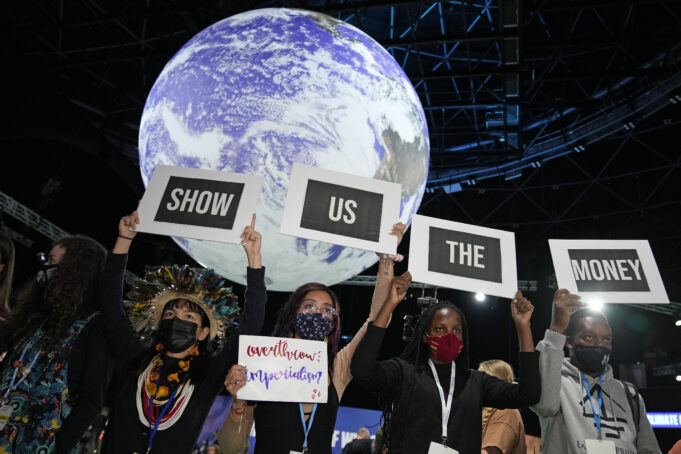Backed into a corner, African leaders have publicly come out swinging. Or should this opening salvo say: Seeing the fate of Africa being at stake African leaders issued “harsh words” to their former colonial masters. According to Senegalese President and African Union chief Macky Sall, the European powers “have not just put the fate of Africa … at stake but the fate of humanity and the future of the planet.” Sall was referring to the planet’s climate emergency while at the Adaptation Summit in Rotterdam.
Ghanaian President Nana Akufo-Addo’s follow-up comments at the summit were just as harsh. He referred to the Western powers as “the main polluters of the planet, and they are the ones who have to finance adaptations.” Europe’s Dutch Prime Minister Mark Rutte attended the summit in person.

“I think that if we made the effort to leave Africa and come to Rotterdam it was easier for the others to be here,” Akufo-Addo added. “If we want our continent to thrive, we have to adapt to climate change and to achieve this, adaptation financing needs to start flowing at scale,” he said.
President of the Democratic Republic of the Congo, Felix Tshisekedi, highlighted the absence of the main perpetrators of the world’s climate change emergency.
He noted that at some point, since they are the world’s “biggest polluters” they “would have had to answer to our questions.” Tshisekedi observed, “The African continent has the smallest impact on climate change, but paradoxically suffers the majority of its consequences.”
One might have surmised, what made African leaders think that European heads of state were willing to attend a summit where they’d be taken to task for behaviors that in the past, they have blatantly been able to get away with?
Africa is bearing the brunt of the world’s climate emergency. The UN says climate change threatens to expose over 100 million vulnerable Africans to droughts, floods and extreme heat by the year 2030.
According to Politico, last November’s UN Glasgow Climate Summit was the first major test of the developed world’s commitment. Reuters noted, during the world powers meeting European powers pledged to double the funding for such “adaptation projects” for developing countries to around $40 billion a year by 2025.
And, Global Times reported and raised the question: Since European powers shunned their African counterparts on the climate meeting and dodged their moral obligation and hampered a chance at global cooperation, one wonders what’s in store for the upcoming crucial COP27 climate conference in Egypt in November?
Africa accounts for the smallest share of global greenhouse gas emissions at just 3.8 percent, notes a report published by the Brookings Institution. Yet the 10 most vulnerable countries to climate change are in Africa, according to Mo Ibrahim Foundation’s 2022 Forum Report.
The grim reality is industrialized nations, including European countries and U.S., are the real culprits when it comes to greenhouse gas emissions. According to the UN, “climate change refers to long-term shifts in temperatures and weather patterns. These shifts may be natural, such as through variations in the solar cycle. But since the 1800s, human activities have been the main driver of climate change, primarily due to burning fossil fuels like coal, oil and gas.
“Burning fossil fuels generates greenhouse gas emissions that act like a blanket wrapped around the Earth, trapping the sun’s heat and raising temperatures.
“Examples of greenhouse gas emissions that are causing climate change include carbon dioxide and methane. These come from using gasoline for driving a car or coal for heating a building. Clearing land and forests can also release carbon dioxide. Landfills for garbage are a major source of methane emissions. Energy, industry, transport, buildings, agriculture and land use are among the main emitters.”
According to African Development Bank president Akinwumi Adesina, in Africa, the continent is no more than three percent of the problem. “We, today, are suffering a deluge as a result of that. We lose on the continent anywhere between $7 and $15 billion as a result of climate change. We are very low-income countries generally. And if we don’t get climate change finance it’ll rise to $50 billion annually. You can imagine how much (of) that is for us. Almost seven percent of our GDP would be lost because of climate change,” he said.
The funds are necessary, Adesina added. “And the amount of climate finance that Africa needs is between $112 billion to $125 billion annually. But Africa is getting only three percent of global finance. Which means that Africa that did not cause climate change is suffering.”
Follow @JehronMuhammad on Twitter













